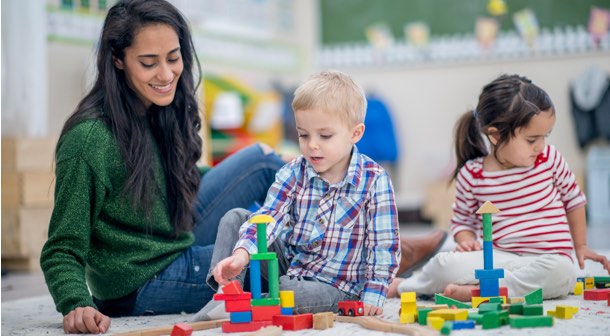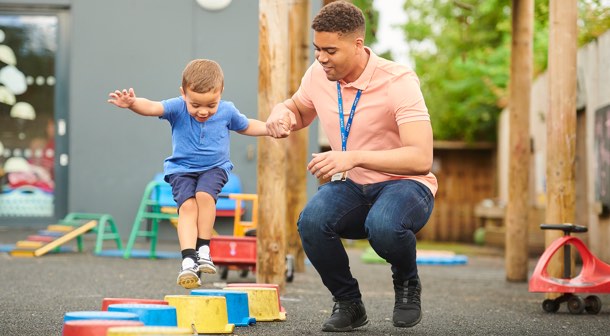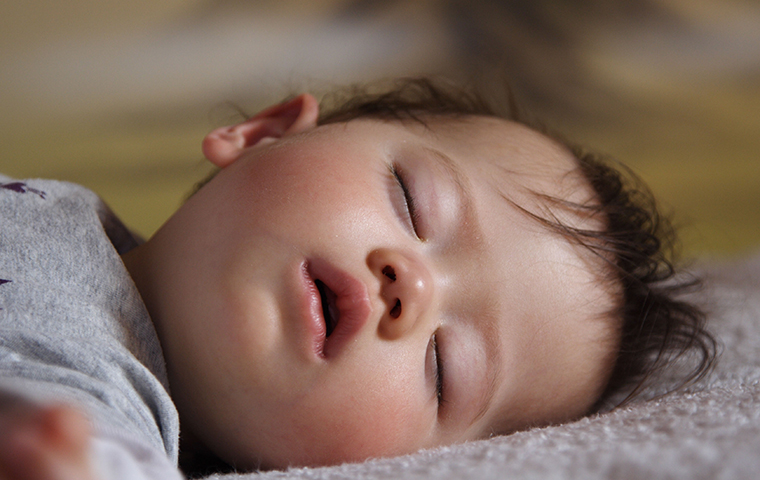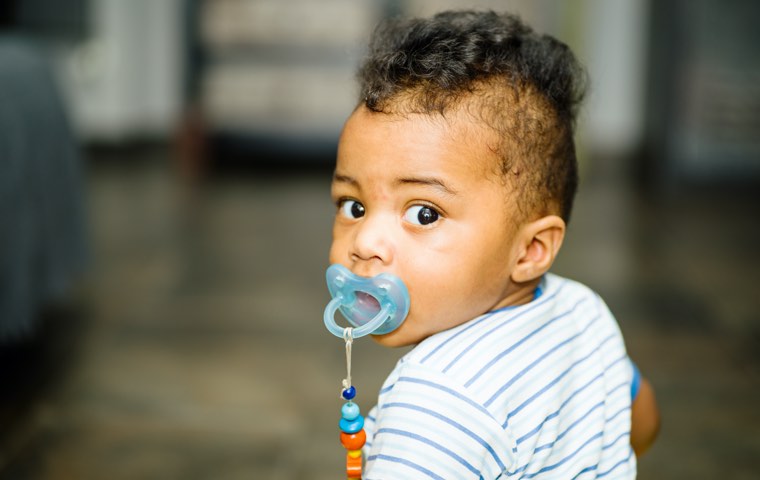Leaving your child in someone else's care can be scary and stressful, but quality child care is a wonderful way to provide your child with a fun, educational, and enriching experience. He (or she) will learn so much from being with other children and being cared for by other attentive adults. By doing your research you can find a daycare that you're comfortable with and know that your child is in good hands.
Whether you're looking for a babysitter, child care center, or in-home daycare, we'll give you interview questions, checklists, and resources for finding the child care that's best for you and your child.
What's the difference between babysitting and child care? The simple answer is that babysitters come to your home and care for only your child, while child care occurs in someone else's home, school, or business and is regulated by the Texas Health and Human Services' Child Care Regulation division.

Where to find a babysitter
- Ask your friends, neighbors, or the staff at your daycare center for recommendations.
- Research babysitting services and be sure to read their reviews to find a service with a good reputation.
- Check your neighborhood message boards for people advertising babysitting services.
Before you hire a babysitter
Follow this checklist when choosing a new babysitter.
- Interview the babysitter before hiring her (or him) to watch your child. Here are some suggested interview questions:
- How many years have you been babysitting?
- What age children have you watched?
- How many children have you watched at one time?
- Have you taken a babysitting or CPR/first aid course?
- Can you change a diaper?
- What do you do to calm a crying baby?
- How would you handle an emergency like fire or injury?
- What's your approach to discipline?
- What is your hourly rate?
- Are there other people you babysit for who I could call?
- Be sure the babysitter is at least 14 years old (minimum legal work age) and is mature enough to handle common emergencies. Use your best judgment about the age of a babysitter considering what's right for you and your family. A good guideline is to only use a younger babysitter (age 14–15) for times you'll be gone for just an hour or two. A babysitter who is age 16 or older should be able to handle watching your child for longer periods of time. Also consider the age of your child. If you have an infant, you may feel more comfortable with an older babysitter.
- Do a trial run. Have the babysitter watch your child while you're at home until you feel comfortable leaving her in charge.
- Explain any special needs or allergies your child may have.
- Explain house rules for food, playing outside, cleaning, naptime, and having guests over.
Listen to your instincts. Don't leave your child with a babysitter if something feels off or not right.

Before you leave your child with a new babysitter:
- Fill out an emergency contact sheet and give a printed or electronic copy to the babysitter. You can also post it somewhere in your home to make easy to find.
- Make a list of notes about your child's nap or bedtime routine, feeding routines, food preferences or allergies, and household rules about TV and screen time. Having a list will help you remember what you want to make sure the babysitter knows before you leave.
- Show the babysitter where you keep the first aid kit and fire extinguisher and go over what to do in case of an emergency.
- If you have a pool, secure gates and doors to prevent access.
- Say goodbye to your child. Don't try to leave while your child is distracted to try to avoid upsetting him. If he cries when you leave, let the babysitter know you'll call in a bit to check on him. Even if your child is fine when you leave, it's still a good idea to call and check in once while you're gone.
- Let the babysitter know when you'll be home and call to give an updated time if you're going to be late.
After you get back, or the following morning if your kids are asleep, ask them how everything went with the babysitter. Ask specific questions, such as: What did you eat? What did you do together? How did bedtime go (if applicable)?

Choosing a child care center or in-home daycare
There are many types of child care but make sure the one you choose is regulated by the State. There are child care centers and there are in-home daycares. There are full-time daycares that care for young children all day while parents work. There are part-time centers that provide social and educational opportunities for children but don't provide child care for the full workday. Working parents may choose to send their children to a full-day child care center or combine part-time daycare with hiring a babysitter or asking a family member to watch their child during the hours the child isn't in child care.
Childcare centers can be in their own building, a church, a school, or even a place of business. In-home daycares are located in the home of the child care provider. There are benefits and things to consider about the setting, group size, and services offered by the daycare as well as its approach to child development. You should start by visiting the Search Texas Child Care database to find a daycare near you. This official State of Texas resource allows you to not only find daycares in your area but to see how well they comply with state minimum standards. You may also want to check out a friend's recommendation. Consider what's most important to you and make a list of places you'd like to visit.
Again, always make sure the daycare you pick is licensed, registered, or listed in the state database and that you're comfortable with its record.
Need parenting help now?
The Texas Parent Helpline is available 24/7.
- Call 833-680-0611
- Chat with us
- Text 833-680-0611
Checklist for choosing child care
Here's a checklist of questions to ask when visiting any daycare. Reputable and trustworthy child care providers will have no problem with you asking these questions, so trust your instincts when in doubt. It's better to look for another place for your child than to ignore your feelings.
Licensing and Staff
- Are they licensed, registered, or listed by Texas Child Care Licensing? Are they accredited? What is their compliance history with the State of Texas? You can check a child care center's record by going to txchildcaresearch.org.
- What is the ratio of staff to children?
- What training or education do the childcare providers/teachers have? Are there any additional trainings provided to the staff? If so, how often do these trainings occur?
- What is the program's approach to discipline?
- Is everyone on staff currently certified in first aid/CPR?
- How long have staff members worked at the daycare? What qualifications and experience do they look for when hiring?
- How comfortable are you speaking with the staff? Are they approachable and easy to talk to? Can you talk to the director of the daycare?
- Are there parents of children in care that you can contact to ask their opinion of the child care center or in-home daycare?
- How long has the daycare center or in-home daycare been in operation?
Cost and Hours
- How much does child care cost? Are there extra fees or added services that may cost additional money each month?
- Is there a waiting list at the child care center or in-home daycare?
- What hours is it open?
- What happens if you are late picking up your child?
- What days is the daycare closed, such as holidays and vacation days?
- Do they offer pro-rated tuition or financial aid?
Before you choose a child care center or in-home daycare, plan to visit unannounced and take note of how the staff interacts with the children. Do the children seem well cared for and happy? Is the staff happy? Put yourself in your child's shoes.

Policies
Ask about the child care center or in-home daycare's policies for the following:
- Cleaning
- Is the environment safe and clean, and are there procedures for keeping things sanitary?
- What are the procedures for changing diapers and potty training?
- Are diaper stations separate from food prep/eating areas?
- How often do children and adults wash their hands?
- Are toys sanitized after use?
- Safety
- Are choking hazards within reach of young children and babies?
- Are doors to the outside locked?
- Is the outdoor play area safe and fenced in?
- Is the sleep environment safe for infants? Babies should sleep on their back in a crib with no fluffy bedding, blankets, stuffed animals, or pillows.
- Do they take and share pictures or videos of kids? Do they post pictures on social media?
- What is their transportation policy? If they are transporting children, do they have proper car seats, booster seats, and seat belts installed in their vehicles? Has the staff received transportation training?
- Health
- What does the child care do when children are sick or injured? What are the criteria for a child to come back after being sick?
- What is the procedure for administering medication?
- What is their immunization policy?
- What procedures do they use to protect children with food or environmental allergies?
- Feeding
- Do they provide a refrigerator to store breastmilk?
- Can breastfeeding mothers visit during the day to nurse their baby? It's a state requirement for childcare centers.
- Do they provide children with meals or are parents expected to bring meals each day?
- What kinds of foods do they serve the children?
- Visitation
- What is their pick-up visitation policy during operating hours? Are only approved visitors able to visit and pick up children?
- Are visitors required to show identification?
- Can you visit before your child is enrolled? Know that state regulation requires daycares to allow you to visit and observe.
You'll want to start searching for child care well before your child is born because waiting lists can be long for a quality childcare provider. You may be focused on finding a child care center or in-home daycare that works well for your baby, but plan ahead - potty training and playground safety will be important before you know it.

Approach to Child Care
- What is their approach to teaching young children?
- How are children divided by rooms? What ages are grouped together?
- What's an example of a daily schedule for your child's age group?
- What activities are offered to the children?
- How do they create a fun and educational environment for children?
- How will they communicate and provide feedback about your child? Is it daily? Or do they communicate only if there's an issue?
There are many approaches to early childhood development. When choosing child care, look for child care centers or in-home daycares that include unstructured play as a focus of the child's day. Play allows children to take the lead, explore their environment, and make meaningful discoveries that will nurture a love of learning.
You are not alone if you feel hesitant about taking your child to daycare or leaving him with a babysitter. There are a lot of resources to help you find the right childcare provider for you and your child. The State of Texas offers a powerful tool that allows you to search by type of childcare provider, location, age of child, and programs provided.
It can be hard to trust someone else with caring for your child. Doing a little research and investigating different childcare options will help you feel more confident leaving your child with a new caregiver.
For more information on choosing childcare, visit Texas Child Care Licensing.




